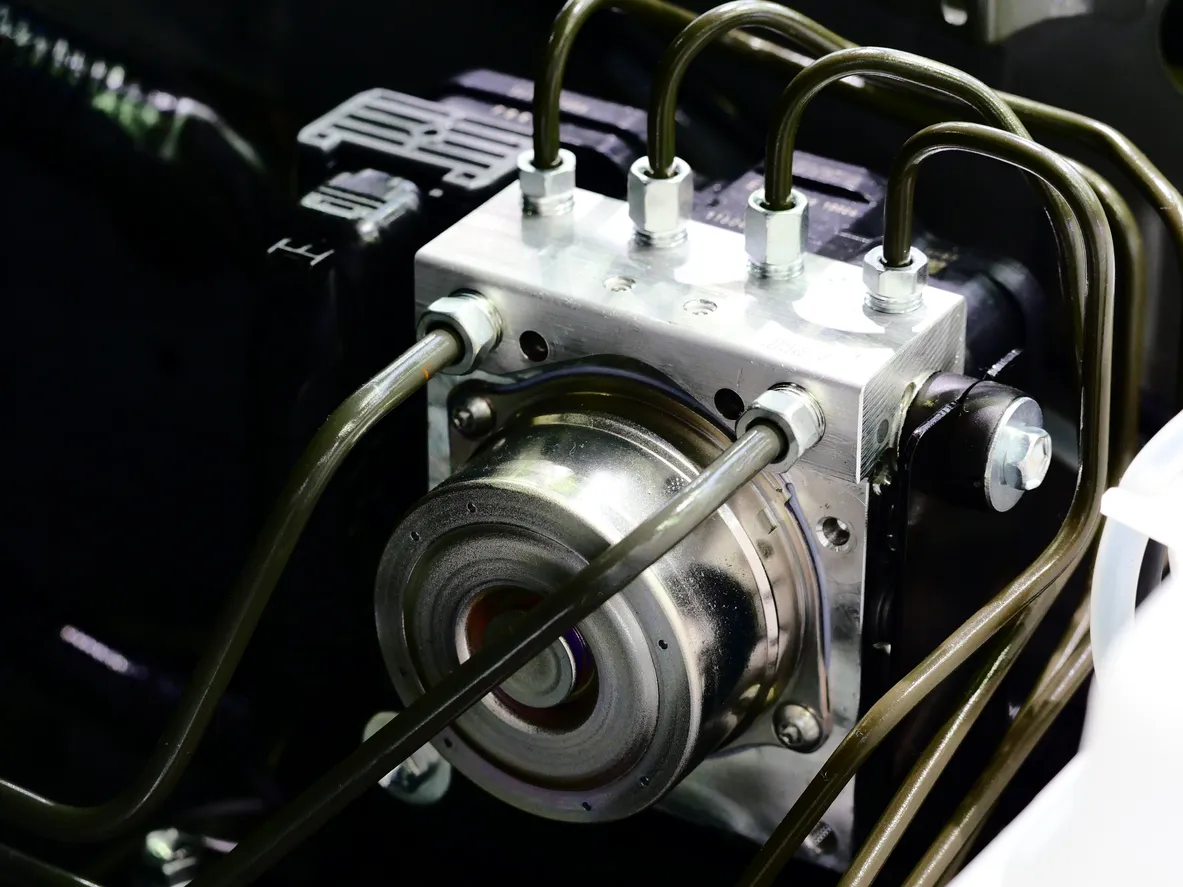What Is Anti-Lock Braking System?

The anti-lock braking system (ABS) is a pivotal automotive innovation that plays a vital role in vehicle safety. The ABS is designed to prevent wheels from locking up when you apply your vehicle's brakes and is a standard feature in most modern vehicles. Since their development and implementation in the early 70s, anti-lock brakes have significantly reduced the risk of accidents. Without anti-lock brakes, you can't stop as effectively, you are more likely to lose control, and you will struggle to drive safely in more hazardous conditions.
What Does ABS Mean On a Car?
ABS, which stands for “Anti-Lock Braking System,” is a crucial safety feature in modern vehicles designed to prevent wheels from locking during braking. With traditional braking systems, wheels lock up when a driver applies the brakes in an emergency or on slippery surfaces. However, with the anti-lock braking system technology a sensor detects when a wheel is about to lock up and begin skidding. It adjusts brake pressure to each wheel independently through hydraulic valves, allowing them to continue rotating while braking and preventing wheel lockup. This, in turn, allows the wheels to maintain traction with the road surface and the driver to maintain control over the steering direction.
How Do Anti-Lock Brakes Work?
Anti-lock brakes are an advanced technology that relies on a series of special mechanisms to work. Each wheel has a speed sensor on it, and your car can determine when a wheel is about to lock up when it slows down much faster than the other wheels. There are 3 key components that operate together seamlessly in the background during vehicle operation to prevent wheel lockup (and maintain traction) when brakes are applied:
- Sensors: these continually monitor the speed of each wheel and alert the anti-lock braking system to intervene if a wheel is decelerating too rapidly (this rapid deceleration typically indicates a potential wheel lockup).
- Controller: the controller, also known as the control unit or electronic control unit (ECU), is the brain of the ABS. The control unit receives signals from the sensors, processes the information to determine if a wheel lockup is about to happen, and sends signals to modulate brake pressure accordingly.
-
Hydraulic Control Unit: the hydraulic control unit consists of pumps and valves that control fluid flow to and from each wheel's brake caliper or drum to adjust brake pressure when signaled by the ECU.
In simple terms anti-lock brakes work by detecting when a tire slows down rapidly and cutting off brake pressure to that wheel specifically. So when a driver hits the brakes, the anti-lock braking system’s sensors monitor the rotational speed of each wheel and send a signal to the control unit if it detects a potential lockup (which usually occurs when a wheel is decelerating too quickly). The control unit processes this signal, determines the appropriate course of action, and calculates the optimal brake pressure needed to prevent wheel lockup while maintaining traction. It then instructs the hydraulic control unit to modulate brake pressure by reducing brake pressure to the locking wheels and increasing it once the wheels can turn freely. This release and increase of brake pressure is done in quick succession.
The ABS system continues to monitor wheel speed and adjust brake pressure as needed throughout this process until it detects the threat of a lockup has passed, after which it returns brake pressure to normal and allows the wheels to brake normally. By doing this, the ABS allows the affected wheels to continue to rotate, thereby ensuring that the vehicle still maintains traction with the road surface and allowing the driver to retain steering control and potentially avoid obstacles or hazards.
It feels a little odd when your brakes pulse heavily, but when you feel that you know you're being protected by your ABS system and you have more control than you would without the pulsing.
Types Of ABS System

ABS systems used in vehicles are currently grouped into 3 categories based on their configuration and functionality. Each type of ABS offers varying levels of complexity and effectiveness in preventing wheel lockup and enhancing vehicle stability and control.
Four-Channel/Four-Sensor ABS (4-wheel ABS)
This is the most common type of ABS found in modern vehicles and is considered the best type of anti-lock braking system currently available. The four-channel/four-sensor ABS utilizes a separate sensor and valve for each wheel to independently monitor wheel speed and adjust brake pressure individually for each one. This allows for precise wheel control and ensures that wheel lockup is prevented on all four wheels.
Three-Channel/Three-Sensor ABS
This type of ABS operates with two sensors in the front and a third in the rear. With the three-channel/three-sensor anti-lock braking system, individual control or valves and sensors are applied for each front wheel, while the rear wheels share one valve and sensor. Pickup trucks typically use this type of ABS. However, because of the shared sensor and valve, both rear wheels can be affected if locking occurs; braking effectiveness may also be compromised if only one rear wheel locks up.
One-Channel/One-Sensor ABS
One-channel/one-sensor anti-lock braking systems are a simpler and less costly type of ABS (compared to multi-channel ones) commonly found on pickup trucks with rear wheels. This type of ABS utilizes only one sensor to monitor the wheels and one valve to simultaneously control brake pressure for both rear wheels. While not as effective as multi-channel ABS in preventing wheel lockup, it still provides some level of anti-lock braking functionality, particularly in rear-wheel-drive vehicles. However, as is the case with three-channel anti-lock brakes, there is always a risk of reduced brake efficiency if only one rear wheel locks up.
What Is the Main Advantage of ABS Brakes Over Standard Brakes
Some of the main benefits of an anti-lock braking system (ABS) over standard brakes include safer stopping on icy roads. The others include:
- Enhanced Vehicle Control and Stability: With standard car brakes, sudden braking can cause wheel lockup, resulting in a loss of steering control and a higher risk of skidding. ABS system prevents wheel lockup, allowing drivers to maintain steering control even in emergency braking scenarios, which helps them maneuver around obstacles or hazards more effectively.
- Consistent Performance Across Road Conditions: Unlike standard brakes, which may be less effective on icy or wet roads, ABS is designed to provide reliable performance across various surfaces. This consistency enhances safety and stability, especially when traction is compromised.
- Reduced Wear on Tires and Brake Components: Anti lock braking system maximizes braking efficiency by modulating brake pressure, which reduces wear on tires, brake pads, and brake discs during emergency stops, whereas standard brakes can cause faster wear under intense braking.
- Compensation for Driver Error: In emergency situations, standard brakes can lead to wheel lockup if too much force is applied. The ABS system, however, automatically modulates brake pressure to prevent lockup, adding an extra layer of safety—especially valuable for less experienced drivers.
Common ABS Problems and Solutions
Even though ABS systems are highly reliable, they can still encounter issues that may affect their performance. Here are some signs that your Anti-lock brakes may be malfunctioning and basic tips to troubleshoot these problems:
Issue 1: The ABS warning light on your dashboard is on.
Troubleshooting Tip: Check the vehicle’s owner’s manual for manufacturer-specific instructions or recommended troubleshooting steps.
Issue 2: Your brake pedal feels too soft or spongy or vibrates or pulsates during braking.
Troubleshooting Tip: Inspect your vehicle’s brake fluid reservoir and ensure that the brake fluid is filled to the recommended level.
Issue 3: You notice longer stopping distances when you hit your brakes or increased difficulty maintaining steering control during emergency braking.
Troubleshooting Tip: Find a safe, open area and perform a test drive to activate your vehicle’s anti-lock braking system. Apply the brakes firmly on a slippery surface to see if the ABS engages properly. Take note of any abnormal behavior or lack of ABS activation.
Issue 4: There are grinding, clicking, or buzzing noises coming from your brakes.
Troubleshooting Tip: Inspect the ABS sensors for damage or contamination, clean any dirt, debris, or corrosion from each sensor’s surface, and ensure they are securely mounted.
If you cannot troubleshoot the ABS issues you notice yourself, or if they persist after doing so, you should consider getting a qualified mechanic specializing in your vehicle's make and model to diagnose and address the problem professionally. It is also advisable to seek professional assistance as soon as you notice any issues that affect your vehicle’s braking effectiveness or ability to maintain control during braking maneuvers.
Should You Pump Your Brakes if You have ABS

Some drivers that learned to drive on older models of vehicles have the tendency to pump their brakes when stopping in slippery conditions. This isn't necessary when driving a vehicle equipped with anti-lock brakes. Anti-lock brakes prevent the wheels from ever locking up and sliding in the first place, so pumping the brakes isn't necessary.
If you pump your brakes, you'll prevent your ABS system from working effectively, and you'll increase your stopping distance. Pumping your brakes can actually put you in more danger, and you should avoid doing so.
Now that you know how anti-lock brakes work, you should make sure you only purchase vehicles equipped with this technology.
When looking at a car history report and the overall specifications of a used vehicle, make sure it comes with basic safety equipment such as airbags, anti-lock brakes, traction control systems, and more. These technological advancements make driving significantly safer, and you should avoid driving old vehicles without these safety features as much as possible to keep yourself safe.
FREE Vehicle Search
- Accidents
- Problem Checks
- Title Records
- Recalls
- Values
- Specs
-
InfoPay, Inc. (dba GoodCar) is an Approved NMVTIS Data Provider
-
-












































